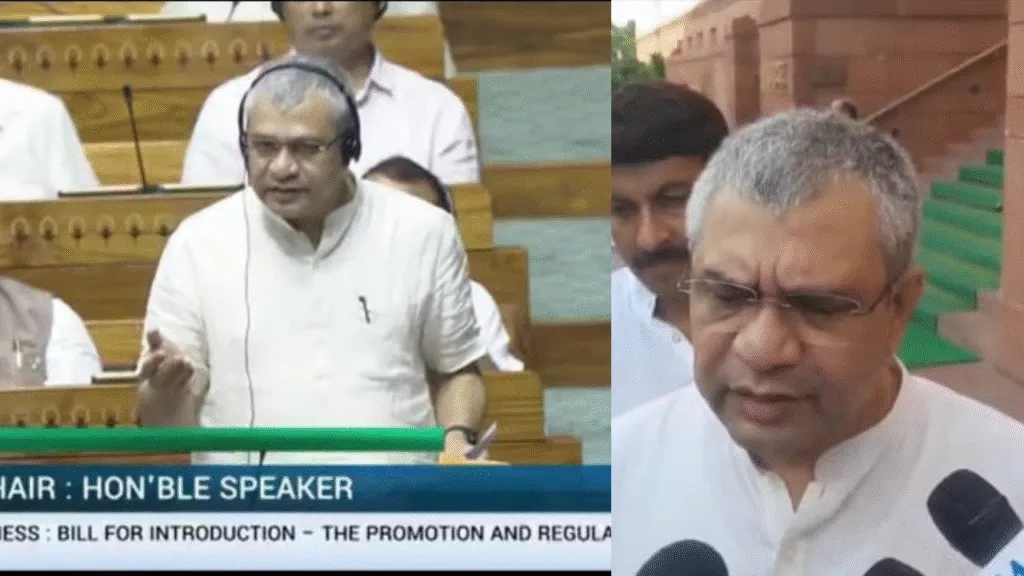Online Gaming Bill Passed in Lok Sabha: Real-Money Games Banned, E-Sports Recognised
New Delhi, August 20, 2025 — In a major decision aimed at regulating India’s rapidly growing digital entertainment industry, the Lok Sabha on Wednesday passed the Promotion and Regulation of Online Gaming Bill, 2025, which completely bans all real-money and gambling games in the country and formally recognises e-sports and educational gaming as legitimate activities.
The legislation seeks to address growing concerns regarding youth addiction, financial fraud, and the recent rise in money laundering via online betting platforms.
Key Provisions of the Bill
According to the bill tabled by the Ministry of Electronics and Information Technology (MeitY), the government has introduced a series of strict regulations to clean up the sector:
- Complete Ban on Real-Money Gaming
Any online game where players deposit money and stand a chance to win cash prizes — including fantasy sports, poker, rummy and casino-style games — will now be illegal in India, irrespective of whether it is “skill-based” or “chance-based”. Platforms hosting such games will face stringent punishment. - Strict Penalties for Platforms and Advertisers
Companies or individuals who promote, operate or advertise restricted games may face jail terms of up to three years and/or a fine of up to ₹1 crore.
Advertising agencies and celebrity influencers endorsing real-money gaming platforms may be jailed for up to two years and fined up to ₹50 lakh. - Creation of a New Regulatory Authority
The bill proposes setting up a National Online Gaming Commission (NOGC) to regulate the sector. The authority will categorise games, issue registrations, handle complaints and draft future guidelines. - Promotion of E-Sports and Educational Games
Legitimate e-sports tournaments, training centres, game development institutes and awareness campaigns will receive full policy support. Social and educational digital games will also be actively promoted. - National Security and Financial Protection Measures
The bill states that unregulated real-money gaming has led to increased cases of fraud, addiction and illegal fund transfers. It claims the ban will safeguard the financial wellbeing of millions of users and help curb cross-border money laundering.
Industry Reactions and Concerns
While the government has described the move as “necessary in public interest”, the industry has reacted sharply:
- Gaming Associations Term the Bill “Regressive”
The All India Gaming Federation (AIGF), E-Gaming Federation (EGF) and Federation of Indian Fantasy Sports (FIFS) issued a joint statement saying the bill was passed “without proper consultation” and has put over 2 lakh jobs and 400 Indian gaming startups at risk. - Investors Raise Alarm
According to a NASSCOM report, India’s real-money gaming sector attracted over $2.8 billion in investments over the past five years. Investors now fear that the sudden blanket ban may discourage future funding and harm the country’s startup ecosystem. - Violation of Judicial Precedents?
Several High Courts have previously classified fantasy sports and rummy as “games of skill”. Critics argue the new legislation overrides those judgments and could be challenged constitutionally in the Supreme Court. - Opposition Demands a Parliamentary Review
Senior Congress MP Karti Chidambaram said the bill was a “knee-jerk reaction” and demanded it be sent to a Select Committee for broader consultation with gaming companies, mental health experts and the general public.
Wider Social & Sporting Impact
Analysts say the impact of the bill will extend far beyond the gaming industry:
- Impact on Sports Sponsorships
Major fantasy platforms like Dream11 and My11Circle are key sponsors of cricket leagues and franchises. If the ban is enforced, BCCI and several IPL teams may lose major sponsorship revenues — potentially affecting the sport’s financial ecosystem. - Government Cites Rising Youth Addiction
IT Minister Ashwini Vaishnaw called online money gaming “a bigger social issue than drug abuse”, pointing to several recent cases where young individuals lost their money and fell into debt or committed suicide.
What Happens Next?
The bill will now be sent to the Rajya Sabha. If cleared, it will become law after receiving the President’s assent.
With this legislation, the government has clearly made the public safety and ethical regulation of online gaming a national priority. While the move may protect vulnerable users and strengthen national security, it poses a serious challenge for India’s real-money gaming sector and the thousands of livelihoods linked to it.
The coming weeks will determine whether this bold step leads to stricter control or sparks legal and political backlash.
Also Read: Ashley St Clair Evicted Over Elon Musk’s Baby Drama!




































